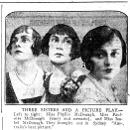A crime caper and romance, The Cheaters was the third film by the McDonagh sisters, Paulette, Phyllis, and Isabelle.
Though it was originally made as a silent film, sound was added to three sections before the film was entered for the 1930 Commonwealth Film Prize. Unsuccessful in the competition, it premiered in Sydney cinemas in mid-1930.
Contemporary reviews criticised the film for having 'have slavishly copied American models. Instead of striving to give their work originality, the Americanisms, "big boy," "dame," and '"gangster," creep into the captions' and point out that, overall, the film
'suffers from a poor, badly-told story. Especially toward the end, absurdities spring up in battalions. The piece of dialogue that brings the picture to a close is an extreme example of bathos. It would surely be easy enough to write such dialogue in the modern spirit, instead of in the bombastically sentimental style of out-worn melodrama.'
Source
'Australian Film. "The Cheaters"', Sydney Morning Herald, 2 June 1930, p.8.

 2005370063617276713.jpg
2005370063617276713.jpg